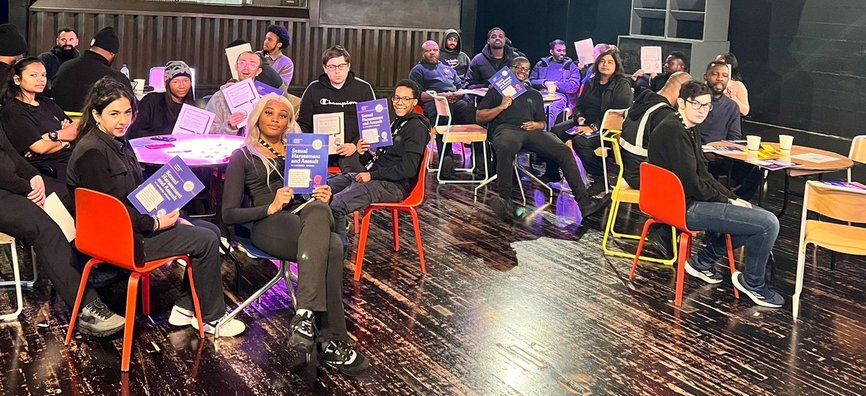We carry out an annual survey of Trustees and staff to help us track progress on the diversity of our people. In 2023, we also asked a question on salary to help us understand our gender and ethnicity pay gaps.
We first surveyed Trustees and staff in 2020 and have since repeated the survey every September. The survey is anonymous and the questions focus on a number of characteristics including ethnicity, gender, disability, age, faith and sexual orientation, reflecting the categories in the DEI Data Standard.
In 2023, as well as asking about salary, we also asked additional questions around socioeconomic background.
The data
A total of 49 members of staff and Trustees took part in our 2023 survey (compared to 48 people in 2022). Our team has grown over the last year, and the data reflected here includes 8 people who did not respond to the survey. This data is presented as 'Did not respond' in the charts.
For all questions, respondents were able to choose 'Prefer not to say'.
Ethnicity
In 2023, 57% of Esmée staff and Trustees identified as White*, 27% identified as a category that wasn't White, and 16% did not respond. For comparison, the UK as a whole is 86% White (see Ethnicity Facts and Figures).
Our Trustees, Funding Team and Senior Management Team (SMT) are the least diverse. The grouping for all other staff is the most diverse with 44% identifying as White and 56% identifying as another category.
The following chart and table shows the ethnicity breakdown of our Trustees, SMT, Funding Team and all our other staff in 2023.
* Respondents were able to choose from a number of White ethnic groups (including White - other or say an ethnicity not specified in the list). For these results, we have chosen not to publish more detailed data.
| Ethnicity distribution (2022 figures in brackets) | |
|---|---|
| Trustees |
Did not respond: 42% (0%) White: 50% (84%) Mixed - White and Asian/Asian British: 8% (8%) Mixed – Any other Mixed/Multiple ethnic background 0% (8%) |
| Senior Management Team |
Did not respond: 17% (0%) White: 67% (63%) Black/African/Caribbean/Black British - Caribbean 17% (37%) |
| Manages funding (grants or social investments) |
Did not respond: 13% (0%) White: 73% (86%) Black/African/Caribbean/Black British – Any other background: 7% (0%) Mixed – White and Black/African/Caribbean/Black British: 7% (7%) Mixed – White and Asian/Asian British 0% (7%) |
| All other staff |
White: 44% (37%) Asian/Asian British – Any other Asian ethnicity: 13% (21%) Asian/Asian British – Indian: 6% (7%) Black/African/Caribbean/Black British - African: 19% (14%) Black/African/Caribbean/Black British – Any other Black ethnicity: 0% (7%) Mixed - Any other Mixed/Multiple ethnic background: 6% (14%) Mixed - White and Asian/Asian British: 6% (0%) Mixed - White and Black/African/Caribbean/Black British: 6% (0%) |
Gender
Overall, we have more people identifying as female (53%) than male (31%). 16% of our people didn't respond.
The following chart and table shows the gender breakdown of our Trustees, Senior Management Team (SMT), Funding Team and all our other staff in 2023.
| Gender distribution (2022 figures in brackets) | |
|---|---|
| Trustees | Did not respond: 42%, Female: 25% (67%), Male: 33% (33%) |
|
Senior Management Team |
Did not respond: 17%, Female: 33% (62%), Male: 50% (38%) |
|
Manages funding (grants or social investments) |
Did not respond: 13%, Female: 60% (64%), Male: 27% (36%) |
| All other staff | Female: 75% (71%), Male: 25% (29%) |
Esmée's gender and ethnicity pay gap
The gender pay gap is the difference in pay between men and women. The Ethnicity pay gap is the difference in pay between people from communities experiencing racial inequity and people identifying as White.
In 2023, we trialled including a question on pay, and used this to calculate our gender and ethnicity hourly pay gap. The results are in the table below, and reflect the make-up of our team on 1 September 2023:
- We have fewer men, the majority of whom are in senior roles.
- Our team is most ethnically diverse in our resources team where we have more junior roles, and least diverse in our funding and senior management teams.
At the time of asking, we had 39 staff, and 6 staff (15%) did not submit data. When we re-run the survey in 2024, we will aim for a full set of data.
| Mean pay gap | Median pay gap | |
|---|---|---|
| Gender | 22% | 16% |
| Ethnicity | 14% | 9% |
Disability
In total, 27% of our people identified as being disabled or having a health condition, 57% said they did not identify as being disabled or having a health condition, and 16% did not respond.
Age, Sexual Orientation, Faith, and Socioeconomic background
- Age:
All Trustees responding to the survey said they are 45 and over, with the biggest age group being 55-64 years old. There is a relatively even distribution of our staff across the age groups between 25 and 65 years old.
- Sexual orientation
Overall, 4% identified as gay, lesbian or bisexual and 80% identified as heterosexual.
- Faith:
Most people who responded said they were atheist, agnostic or had no religion (47%). The single biggest religious group amongst our people is Christian (20%).
- Socioeconomic background
In 2023, we added two questions designed to measure socioeconomic background suggested by the Social Mobility Commission. These related to the type of school they attended and the profession of people's parents. The data includes 16% of our people who did not respond.
- 57% of Trustees and 15% of staff indicated that they attended a fee paying school without a bursary. By comparison, 7.5% of individuals in the wider population attended a fee paying school without a bursary.
- 57% of Trustees and 61% of staff indicated that their parents held either modern or traditional professional jobs. This compares to 37% of the wider population.





